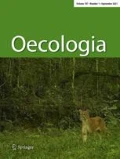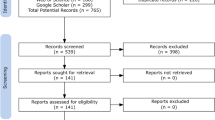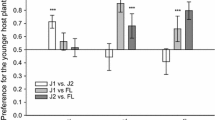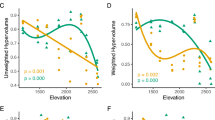Abstract
The effect of herbivory on plant performance is the subject of a large number of ecological studies, and plant responses to herbivory range from reduced reproduction to overcompensation. Because plant defenses, stored resources, and allocation demands change throughout a plant’s lifetime, it can be hypothesized the effects of herbivory also vary with development. The present work extends previous analyses to incorporate hundreds of studies in a new meta-analysis addressing this topic. Herbivores had an overall negative effect on plant growth and reproduction, and, in contrast to a previous meta-analysis, this work shows the timing of herbivory is relevant. Differences in the effects of herbivory between life stages existed for woody plant reproduction and perennial herb growth. In addition, tree and shrub growth was reduced by herbivore damage at early ontogenetic stages, and perennial herb reproduction was limited by adult stage herbivory. These results partially support the continuum of an ontogenetic response model. Finally, consideration of this synthesis in conjunction with other work led to the conclusion that different plant groups optimize their defense investments in unique ways. Slow-growing plants may strongly chemically defend young tissues, supporting the plant–age hypothesis, because early herbivory is detrimental to growth. Faster-growing herbs may invest more in antiherbivore defense when they are older, supporting the growth–differentiation balance hypothesis, because later herbivory limits their reproduction.




Similar content being viewed by others
References
Anderson M, Frank D (2003) Defoliation effects on reproductive biomass: importance of scale and timing. J Range Manag 56:501–516. doi:10.2307/4003843
Ballina-Gomez HS, Iriarte-Vivar S, Orellana R, Santiago LS (2010) Compensatory growth responses to defoliation and light availability in two native Mexican woody plant species. J Trop Ecol 26:163–171. doi:10.1017/S0266467409990514
Barber NA, Adler LS, Bernardo HL (2011) Effects of above- and belowground herbivory on growth, pollination, and reproduction in cucumber. Oecologia 165:377–386. doi:10.1007/s00442-010-1779-x
Barton KE, Koricheva J (2010) The ontogeny of plant defense and herbivory: characterizing general patterns using meta-analysis. Am Nat 175:481–493. doi:10.1086/650722
Belsky A (1986) Does herbivory benefit plants—A review of the evidence. Am Nat 127:870–892. doi:10.1086/284531
Bergelson J, Juenger T, Crawley M (1996) Regrowth following herbivory in Ipomopsis aggregata: compensation but not overcompensation. Am Nat 148:744–755. doi:10.1086/285952
Bigger DS, Marvier MA (1998) How different would a world without herbivory be?: a search for generality in ecology. Integr Biol Issues News Rev 1:60–67
Boege K (2005) Influence of plant ontogeny on compensation to leaf damage. Am J Bot 92:1632–1640. doi:10.3732/ajb.92.10.1632
Boege K, Marquis R (2005) Facing herbivory as you grow up: the ontogeny of resistance in plants. Trends Ecol Evol 20:526–526. doi:10.1016/j.tree.2005.08.003
Borer E, Seabloom E, Shurin J, Anderson K, Blanchette C, Broitman B, Cooper S, Halpern B (2005) What determines the strength of a trophic cascade? Ecology 86:528–537. doi:10.1890/03-0816
Brown VK, Gange AC (1990) Insect herbivory below ground. Adv Ecol Res 20:1–58
Bryant JP, Reichardt PB, Clausen TP, Provenza FD, Kuropat PJ (1992) Woody plant-mammal interactions. In: Rosenthal GA, Berenbaum MR (eds) Herbivores: their interactions with secondary plant metabolites, vol II, 2nd edn. Academic, San Diego, pp 343–371
Carson W, Root R (1999) Top-down effects of insect herbivores during early succession: influence on biomass and plant dominance. Oecologia 121:260–272. doi:10.1007/s004420050928
Carson W, Root R (2000) Herbivory and plant species coexistence: community regulation by an outbreaking phytophagous insect. Ecol Monogr 70:73–99. doi:10.1890/0012-9615(2000)070[0073:HAPSCC]2.0.CO;2
Chun YJ, van Kleunen M, Dawson W (2010) The role of enemy release, tolerance and resistance in plant invasions: linking damage to performance RID B-3769-2009. Ecol Lett 13:937–946. doi:10.1111/j.1461-0248.2010.01498.x
Coley PD, Bryant JP, Chapin FS (1985) Resource availability and plant antiherbivore defense. Science 230:895–899. doi:10.1126/science.230.4728.895
Cronin JP, Tonsor SJ, Carson WP (2010) A simultaneous test of trophic interaction models: which vegetation characteristic explains herbivore control over plant community mass? Ecol Lett 13:202–212. doi:10.1111/j.1461-0248.2009.01420.x
Del-Val E, Crawley M (2005) Are grazing increaser species better tolerators than decreasers? An experimental assessment of defoliation tolerance in eight British grassland species. J Ecol 93:1005–1016. doi:10.1111/j.1365-2745.2005.01011.x
Dhileepan K, McFadyen R (2001) Effects of gall damage by the introduced biocontrol agent Epiblema strenuana (Lep., Tortricidae) on the weed Parthenium hysterophorus (Asteraceae). J Appl Entomol 125:1–8. doi:10.1046/j.1439-0418.2001.00494.x
Dyer LA, Coley PD (2001) Latitudinal gradients in tri-trophic interactions. In: Tscharntke T, Hawkins BA (eds) Multitrophic level interactions. Cambridge University Press, New York, pp 67–88
Ehrlich P, Raven P (1964) Butterflies and plants—A study in coevolution. Evolution 18:586–608. doi:10.2307/2406212
Escarré J, Lepart J, Sentuc J (1996) Effects of simulated herbivory in three old field Compositae with different inflorescence architectures. Oecologia 105:501–508. doi:10.1007/BF00330013
Fornoni J (2011) Ecological and evolutionary implications of plant tolerance to herbivory. Funct Ecol 25:399–407. doi:10.1111/j.1365-2435.2010.01805.x
Guillet C, Bergstrom R (2006) Compensatory growth of fast-growing willow (Salix) coppice in response to simulated large herbivore browsing. Oikos 113:33–42. doi:10.1111/j.0030-1299.2006.13545.x
Gurevitch J, Hedges LV (2001) Meta-analysis: combining the results of independent experiments. In: Scheiner SM, Gurevitch J (eds) Design and analysis of ecological experiments. Oxford University Press, New York, pp 347–369
Hanley ME, Fegan EL (2007) Timing of cotyledon damage affects growth and flowering in mature plants. Plant, Cell Environ 30:812–819. doi:10.1111/j.1365-3040.2007.01671.x
Haukioja E, Koricheva J (2000) Tolerance to herbivory in woody vs. herbaceous plants. Evol Ecol 14:551–562. doi:10.1023/A:1011091606022
Hawkes C, Sullivan J (2001) The impact of herbivory on plants in different resource conditions: a meta-analysis. Ecology 82:2045–2058. doi:10.1890/0012-9658(2001)082[2045:TIOHOP]2.0.CO;2
Heichel G, Turner N (1984) Branch growth and leaf numbers of red maple (Acer rubrum L) and red oak (Quercus rubra L)—Response to defoliation. Oecologia 62:1–6. doi:10.1007/BF00377364
Herms D, Mattson W (1992) The dilemma of plants—To grow or defend. Q Rev Biol 67:283–335. doi:10.1086/417659
Hjältén J, Danell K, Ericson L (1993) Effects of simulated herbivory and intraspecific competition on the compensatory ability of birches. Ecology 74:1136–1142. doi:10.2307/1940483
Hochwender C, Marquis R, Stowe K (2000) The potential for and constraints on the evolution of compensatory ability in Asclepias syriaca. Oecologia 122:361–370. doi:10.1007/s004420050042
Janzen D (1970) Herbivores and the number of tree species in tropical forests. Am Nat 104:501–528. doi:10.1086/282687
Knochel DG, Monson ND, Seastedt TR (2010) Additive effects of aboveground and belowground herbivores on the dominance of spotted knapweed (Centaurea stoebe). Oecologia 164:701–712. doi:10.1007/s00442-010-1708-z
Lehtilä K, Haukioja E, Kaitaniemi P, Laine K (2000) Allocation of resources within mountain birch canopy after simulated winter browsing. Oikos 90:160–170. doi:10.1034/j.1600-0706.2000.900116.x
Lennartsson T, Tuomi J, Nilsson P (1997) Evidence for an evolutionary history of overcompensation in the grassland biennial Gentianella campestris (Gentianaceae). Am Nat 149:1147–1155. doi:10.1086/286043
Levine M, Paige K (2004) Direct and indirect effects of drought on compensation following herbivory in scarlet gilia. Ecology 85:3185–3191. doi:10.1890/03-0748
Maschinski J, Whitham T (1989) The continuum of plant responses to herbivory—The influence of plant-association, nutrient availability, and timing. Am Nat 134:1–19. doi:10.1086/284962
Mauricio R, Rausher M (1997) Experimental manipulation of putative selective agents provides evidence for the role of natural enemies in the evolution of plant defense. Evolution 51:1435–1444. doi:10.2307/2411196
McNaughton S (1979) Grazing as an optimization process—Grass ungulate relationships in the Serengeti. Am Nat 113:691–703. doi:10.1086/283426
McNaughton S (1983) Compensatory plant growth as a response to herbivory. Oikos 40:329–336. doi:10.2307/3544305
Morris WF, Hufbauer RA, Agrawal AA, Bever JD, Borowicz VA, Gilbert GS, Maron JL, Mitchell CE, Parker IM, Power AG, Torchin ME, Vazquez DP (2007) Direct and interactive effects of enemies and mutualists on plant performance: a meta-analysis RID C-2595–2008. Ecology 88:1021–1029. doi:10.1890/06-0442
Newingham BA, Callaway RM, BassiriRad H (2007) Allocating nitrogen away from a herbivore: a novel compensatory response to root herbivory. Oecologia 153:913–920. doi:10.1007/s00442-007-0791-2
Núñez-Farfán J, Fornoni J, Luis Valverde P (2007) The evolution of resistance and tolerance to herbivores. Annu Rev Ecol Evol Syst 38:541–566
Nykänen H, Koricheva J (2004) Damage-induced changes in woody plants and their effects on insect herbivore performance: a meta-analysis. Oikos 104:247–268. doi:10.1111/j.0030-1299.2004.12768.x
Oduor AMO, Gomez JM, Strauss SY (2010) Exotic vertebrate and invertebrate herbivores differ in their impacts on native and exotic plants: a meta-analysis. Biol Invasions 12:407–419. doi:10.1007/s10530-009-9622-1
Paige K, Whitham T (1987) Overcompenstation in response to mammalian herbivory—The advantage of being eaten. Am Nat 129:407–416. doi:10.1086/284645
Poveda K, Jiménez MIG, Kessler A (2010) The enemy as ally: herbivore-induced increase in crop yield. Ecol Appl 20:1787–1793. doi:10.1890/09-1726.1
Preisser EL, Dugaw CJ, Dennis B, Strong DR (2006) Plant facilitation of a belowground predator. Ecology 87:1116–1123. doi:10.1890/0012-9658(2006)87[1116:PFOABP]2.0.CO;2
Redina-Gobioff G, Kromrey JD (2006) PUB_BIAS: a SAS macro for detecting publication bias in meta-analysis. http://analytics.ncsu.edu/sesug/2006/PO04_06.PDF
Rosenberg M (2005) The file-drawer problem revisited: a general weighted method for calculating fail-safe numbers in meta-analysis. Evolution 59:464–468. doi:10.1554/04-602
Stiling P, Cornelissen T (2005) What makes a successful biocontrol agent? A meta-analysis of biological control agent performance. Biol Control 34:236–246. doi:10.1016/j.biocontrol.2005.02.017
Stowe K (1998) Experimental evolution of resistance in Brassica rapa: correlated response of tolerance in lines selected for glucosinolate content. Evolution 52:703–712. doi:10.2307/2411265
Stowe K, Marquis R, Hochwender C, Simms E (2000) The evolutionary ecology of tolerance to consumer damage. Annu Rev Ecol Syst 31:565–595. doi:10.1146/annurev.ecolsys.31.1.565
Strauss S (1991) Direct, indirect, and cumulative effects of 3 native herbivores on a shared host plant. Ecology 72:543–558. doi:10.2307/2937195
Strauss S, Agrawal A (1999) The ecology and evolution of plant tolerance to herbivory. Trends Ecol Evol 14:179–185. doi:10.1016/S0169-5347(98)01576-6
Tiffin P (2000) Mechanisms of tolerance to herbivore damage: what do we know? Evol Ecol 14:523–536. doi:10.1023/A:1010881317261
Tiffin P (2002) Competition and time of damage affect the pattern of selection acting on plant defense against herbivores. Ecology 83:1981–1990. doi:10.2307/3071780
Tiffin P, Rausher M (1999) Genetic constraints and selection acting on tolerance to herbivory in the common morning glory Ipomoea purpurea. Am Nat 154:700–716. doi:10.1086/303271
Treadwell LW, Cuda JP (2007) Effects of defoliation on growth and reproduction of Brazilian peppertree (Schinus terebinthifolius). Weed Sci 55:137–142. doi:10.1614/WS-06-086.1
Trumble J, Kolodnyhirsch D, Ting I (1993) Plant compensation for arthropod herbivory. Annu Rev Entomol 38:93–119. doi:10.1146/annurev.en.38.010193.000521
Tucker C, Avila-Sakar G (2010) Ontogenetic changes in tolerance to herbivory in Arabidopsis. Oecologia 164:1005–1015. doi:10.1007/s00442-010-1738-6
Vanderklein D, Reich P (1999) The effect of defoliation intensity and history on photosynthesis, growth and carbon reserves of two conifers with contrasting leaf lifespans and growth habits. New Phytol 144:121–132. doi:10.1046/j.1469-8137.1999.00496.x
Weltzin J, Archer S, Heitschmidt R (1998) Defoliation and woody plant (Prosopis glandulosa) seedling regeneration: potential vs. realized herbivory tolerance. Plant Ecol 138:127–135. doi:10.1023/A:1009743130922
Whitham TG, Maschinski J, Larson KC, Paige KN (1991) Plant responses to herbivory: the continuum from negative to positive and underlying physiological mechanisms. In: Price PW, Lewinsohn TG, Fernandes GW, Benson WW (eds) Plant–animal interactions: evolutionary ecology in tropical and temperate regions. Wiley, New York, pp 227–256
Zvereva EL, Lanta V, Kozlov MV (2010) Effects of sap-feeding insect herbivores on growth and reproduction of woody plants: a meta-analysis of experimental studies. Oecologia 163:949–960. doi:10.1007/s00442-010-1633-1
Acknowledgments
I would like to thank Genoveva Rodríguez-Castañeda for interesting discussions that led to the writing of this paper. I would also like to thank Susan Trumbore, Angela Smilanich, and two anonymous reviewers for helpful comments on the manuscript. I am grateful to Lee Dyer for developing the SAS code used in the meta-analyses. All work was completed in compliance with ethical and legal requirements.
Author information
Authors and Affiliations
Corresponding author
Additional information
Communicated by John Lill.
Electronic supplementary material
Below is the link to the electronic supplementary material.
Rights and permissions
About this article
Cite this article
Massad, T.J. Ontogenetic differences of herbivory on woody and herbaceous plants: a meta-analysis demonstrating unique effects of herbivory on the young and the old, the slow and the fast. Oecologia 172, 1–10 (2013). https://doi.org/10.1007/s00442-012-2470-1
Received:
Accepted:
Published:
Issue Date:
DOI: https://doi.org/10.1007/s00442-012-2470-1




